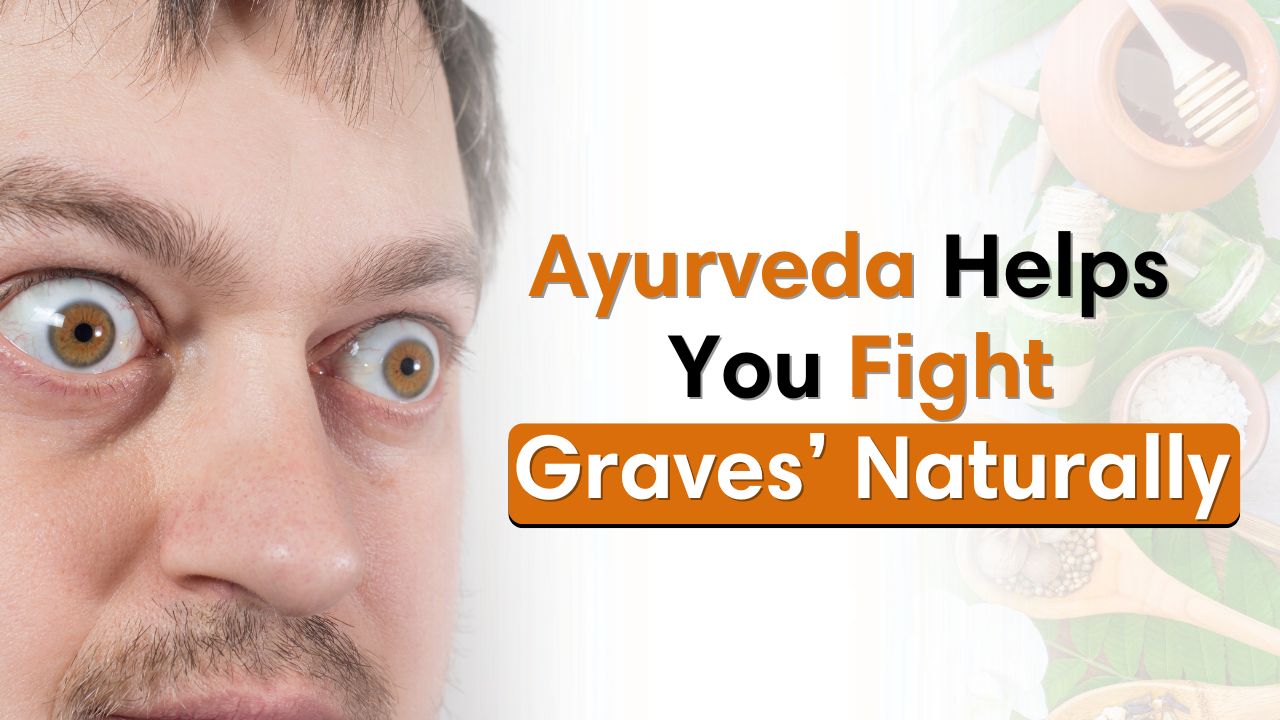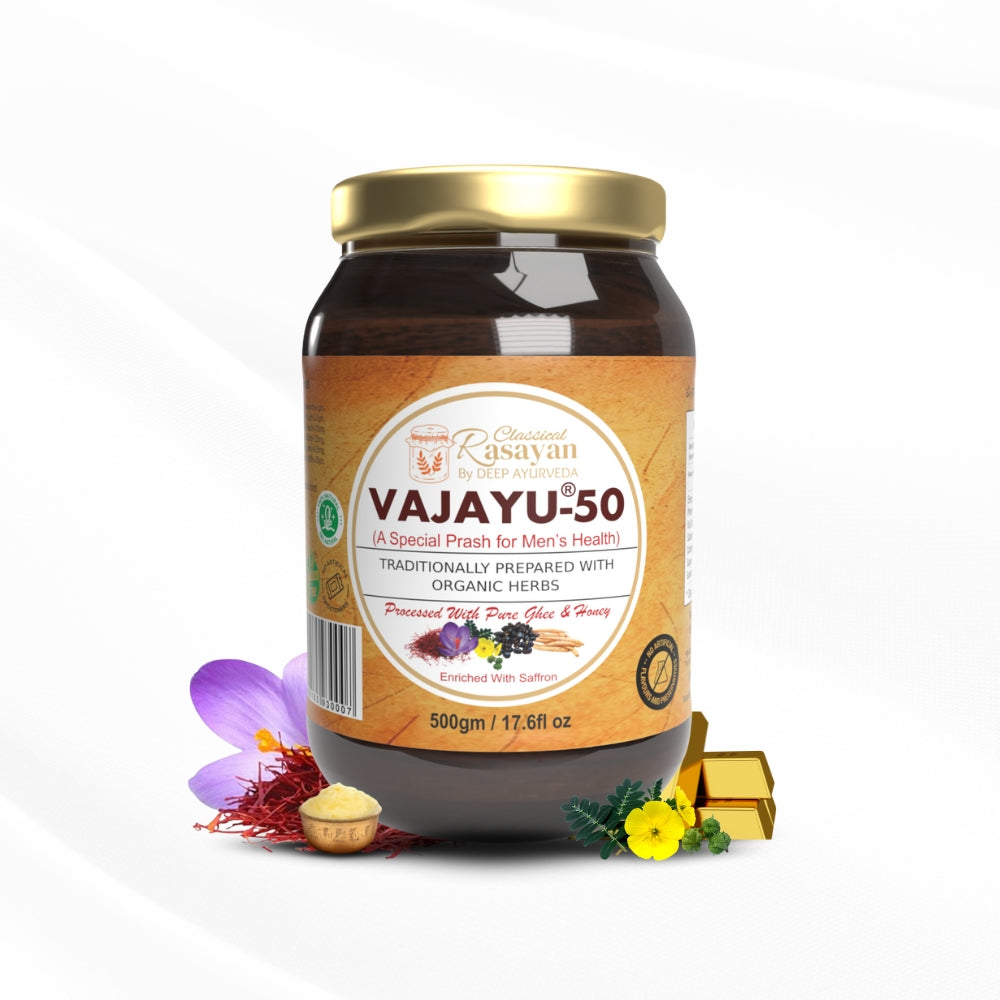Graves’ disease is the most common cause of hyperthyroidism, an autoimmune condition where the body’s immune system overstimulates the thyroid gland, leading to excessive production of thyroid hormones (T3 and T4). While modern medicine provides symptomatic control, Ayurveda offers a deeper, root-cause level healing, restoring systemic balance through detoxification (Shodhana), pacification (Shamana), and rejuvenation (Rasayana) therapies.
In the heart of Tricity – Mohali, Panchkula, and Chandigarh, Deep Ayurveda stands out as a leading center for classical Ayurvedic management of endocrine and autoimmune disorders. Let’s explore Graves’ disease from both the modern and Ayurvedic perspectives, weaving in timeless Sanskrit wisdom and highlighting the therapeutic strengths of Deep Ayurveda.
🔬 Graves’ Disease in Modern Medicine
Graves’ disease results from the immune system producing thyroid-stimulating immunoglobulins (TSIs), which mimic TSH (Thyroid-Stimulating Hormone) and continuously stimulate the thyroid gland. This leads to an overproduction of T3 and T4, triggering symptoms like:
-
Palpitations and tachycardia
-
Heat intolerance and sweating
-
Weight loss despite increased appetite
-
Tremors, anxiety, and insomnia
-
Bulging eyes (Exophthalmos) in up to 30% cases
-
Graves’ dermopathy – thick, red skin on the shins
Graves’ is diagnosed through thyroid function tests (↓TSH, ↑T3/T4), TSI antibody assays, and sometimes radioactive iodine uptake scans.
Modern treatments include antithyroid drugs (like Methimazole), beta-blockers, radioactive iodine therapy, and surgery – yet each comes with limitations and potential side effects.
🪔 Graves’ Disease in Ayurveda: A Deeper Insight
While the thyroid gland isn't directly mentioned in classical texts, its functions correlate with Agni (metabolic fire) and Dhatwagni (tissue-specific metabolism). From an Ayurvedic lens, Graves’ disease arises due to Ati-Agnivaishamya (extreme metabolic imbalance), Vata-Pitta vitiation, Rakta dushti, and Manasika Hetus (mental/emotional triggers).
It overlaps with conditions like Unmada (neuro-psychiatric disturbance), Rajayakshma, and atypical Galaganda (thyroid swelling) with features of Agnimandya-Vriddhi (metabolic aggravation).
🧬 1. Nidana (Etiopathogenesis)
Ayurveda highlights both Sharirika (bodily) and Manasika (psychological) causes. In Graves’, mental stress is a significant precipitating factor.
"शोकोऽयसं भयं क्रोधो दुःखं चिन्ता च चेतसः।
एतेभ्यः सम्भवत्याशु मनसो विकृतिर्नृणाम्॥"
(Charaka Samhita, Chikitsa Sthana 9/4)
Grief, fear, anger, and chronic anxiety disturb mental equilibrium and induce disease.
Other causative factors include:
-
Improper diet (tikshna, ushna, katu food)
-
Excessive exertion
-
Rakta dushti (vitiation of blood tissue)
-
Dhatwagni imbalance
-
Suppression of natural urges (Vega dharana)
-
Overexposure to heat and sun
⚠️ 2. Lakshana (Clinical Features)
The classical features align with Vata-Pittaja symptoms, mental restlessness, ocular inflammation, and heightened metabolism.
"वातपित्तात् क्षुधा तृष्णा भ्रान्तिः शूलं च जायते।"
(Ashtanga Hridaya, Nidana Sthana 7/4)
Due to Vata-Pitta, there arises excessive hunger, thirst, giddiness, and internal pain.
"सदाऽभिभाषतेऽत्यर्थं हसति क्रोशतेऽपि च।
बिभेति नन्दति रुष्टो न तु वेत्ति सुखं च यत्॥"
(Charaka Chikitsa 9/5)
The patient speaks excessively, laughs or cries unnecessarily, becomes fearful or angry — all indicating Unmada-like symptoms.
Ocular features like Exophthalmos relate to Vata-Pittaja Netra Roga:
"नेत्रयोः शोफदाहार्तिः पित्तवातात् स्यादुदीरितम्॥"
(Sushruta Uttara Tantra 7/11)
🧘♀️ 3. Chikitsa Sutra (Therapeutic Protocol)
The Ayurvedic line of treatment focuses on:
-
Vata-Pitta Shamana (Dosha pacification)
-
Rakta Prasadana (Blood purification)
-
Agnivardhana (Metabolic correction)
-
Rasayana (Rejuvenation)
-
Manasika Shanti (Mental harmony)
🌿 Ayurvedic Treatment at Deep Ayurveda
At Deep Ayurveda, treatment is personalized based on Prakriti, Vikriti, and Samprapti. Here's a comprehensive approach:
🔹 Shamana Chikitsa (Herbal & Classical Formulations)
-
Herbs & Rasayana Dravyas:
-
Pravala pishti, Mukta pishti, Shatavari, Yashtimadhu – Pitta-shamak
-
Ashwagandha, Brahmi, Guduchi – Adaptogenic, Rasayana
-
Punarnava, Usheera, Manjistha – Rakta-shodhak
2. Classical Formulations:
-
Kaishora Guggulu – Detoxifying and anti-inflammatory
-
Saraswatarishta – For mental stability
-
Arogyavardhini Vati – Liver and thyroid support
-
Abhraka Bhasma, Swarna Bhasma – Deep Rasayana for neuroendocrine restoration
"दोषाणां सम्यगावस्थायां धातूनां च परिपोषणम्।
रसायनं ततः कुर्यात् जीवनीयगुणप्रदम्॥"
(Charaka Chikitsa 1/7)
🔹 Shodhana Chikitsa (Panchakarma Detox)
-
Virechana (Pitta shodhana)
-
With Trivrit lehya or Avipattikar churna for gentle detoxification
-
Reduces eye symptoms, irritability, insomnia
2. Raktamokshana (if Rakta dushti with Exophthalmos is dominant)
-
Alleviates burning sensation and swelling
3. Nasya & Shirodhara
-
With Brahmi taila, Jatamansi taila for mental calm and Pittta-vata balancing
4. Basti (Enema therapy)
-
Tikta-Ksheera Basti helps in restoring Agni, Rasadhatu, and calming autoimmunity
🔹 Manasika Chikitsa (Mind-Body Integration)
Deep Ayurveda integrates Satvavajaya chikitsa, focusing on:
-
Meditation & Pranayama: Anulom-Vilom, Bhramari
-
Counselling & emotional detox
-
Sattvic diet and routine alignment
🍚 Pathya-Apathya (Diet & Lifestyle)
✅ Pathya (Supportive Regimen):
-
Cooling, stabilizing foods: milk, ghee, moong, old rice
-
Shiro Abhyanga with Brahmi or Ksheerbala taila
-
Regular yoga and pranayama
❌ Apathya (Avoid):
-
Spicy, sour, fermented, and fried food
-
Emotional triggers – anger, stress, anxiety
-
Fasting or overexertion
🏥 Why Deep Ayurveda is the Best Choice in Tricity for Graves’ Disease
With over 17+ years of classical expertise, Deep Ayurveda provides an evidence-based and holistic Ayurvedic solution for autoimmune thyroid conditions like Graves’ disease. Here’s what makes it exceptional:
-
🌿 Individualized root-cause-based therapies
-
👨⚕️ Experienced MD-Ayurveda doctors and Vaidyas
-
🧪 In-house GMP-certified herbal pharmacy
-
🧘♀️ Integrated Panchakarma detox and mental wellness protocols
-
🌐 Global teleconsultation & support
Thousands of patients from Mohali, Panchkula, Chandigarh, and worldwide have experienced long-lasting relief from thyroid imbalance through this integrative Ayurvedic approach.
🔚 Conclusion: Toward Root Cause Healing
Graves’ disease, though rooted in autoimmunity and hormonal chaos, can be successfully managed with Ayurveda’s wisdom of Dosha balance, Agni correction, Rasayana support, and mind-body alignment. By addressing both the visible symptoms and invisible causes, Deep Ayurveda empowers patients with sustainable healing pathways.
📍Visit Deep Ayurveda Today
📌 Location: Mohali | Panchkula | Chandigarh
🌐 Website: www.deepayurveda.in
📞 Contact: +919216582020 (Mohali)
Graves’ disease doesn't just need symptom control — it demands holistic restoration. Trust Ayurveda, trust Deep Ayurveda.






